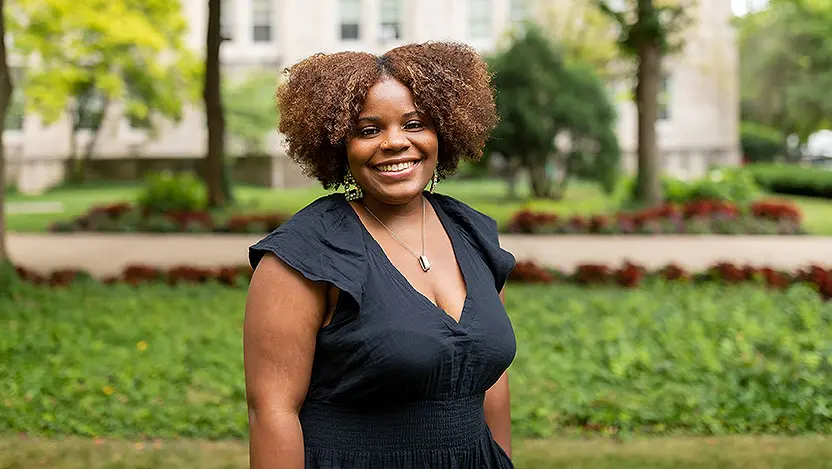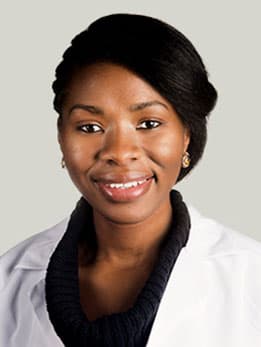‘Life is better now’: Young woman suffering from uterine fibroids finds advocate in her gynecologist

Taiylar Ball, 24, suffered painful periods and other symptoms for years before seeking treatment for uterine fibroids at the UChicago Medicine Center for the Advanced Treatment and Research (CATeR) of Uterine Fibroids.
Taiylar Ball, 24, had been experiencing painful periods for years. At times she suffered nausea and vomiting, had frequent urination and couldn’t move from her couch. She thought everyone’s periods were painful, but when her mother pointed out her bulging stomach, Ball went to see a medical provider. An ultrasound revealed uterine fibroids — benign growths in the uterus that develop in up to 80% of people who can get pregnant.
“I went into research mode,” Ball said.
That research led her to the OB/GYN team at the University of Chicago Medicine Center for the Advanced Treatment and Research (CATeR) of Uterine Fibroids. Ball, a Black woman, wanted a Black OB/GYN who specialized in minimally invasive surgery. After her first appointment with CATeR Director Sandra Laveaux, MD, MPH, Ball knew “she was the one.”
“I felt heard,” Ball said. “It’s important to have a provider you feel comfortable with — whatever that means to you. I knew that Dr. Laveaux was advocating for me.”
Black people are more likely to develop fibroids, to get them younger, and to have larger fibroids than white people. The cause of this disparity is not completely understood and is an important research focus of fibroids at UChicago Medicine.
Ball had five fibroids, and two were the size of grapefruits. When she revealed she also suffered from frequent urination and couldn’t sleep through the night without needing to use the bathroom, Laveaux slowed down talk of surgery until they could determine whether Ball’s fibroids or another underlying issue were causing her urinary problems. If the fibroids weren’t the cause, surgery could possibly wait.
“The timing of surgery is important, and Taiylar is young,” Laveaux said. “There’s always a chance of fibroids recurring, and that risk is higher when we intervene with treatment at a younger age. If I operate on a 20-year-old, the chance they’re going to have another issue with fibroids before menopause is higher than if I operate on a 40-year-old.”
Laveaux referred Ball to UChicago Medicine urogynecologist Diane Glass, MD, PhD, who presented her case to a larger group of specialists. Within a short time, it was determined that the fibroids were contributing significantly to Ball’s urinary issues and that surgery would be the best way to alleviate her symptoms.
“Fibroids are not one size fits all,” Laveaux said. “At UChicago Medicine, we have a multidisciplinary approach to treatment even within the specialty of OB/GYN, and we can work together quickly.”
You don’t realize how much pain you were in until after the surgery. Fibroids really can affect your quality of life.
On May 11, 2022, Ball underwent a robotic myomectomy — a minimally invasive surgical procedure to remove the fibroids while keeping the uterus intact for future pregnancy.
“You don’t realize how much pain you were in until after the surgery,” Ball said. “Fibroids really can affect your quality of life.”
A myomectomy is the “gold standard” when surgically treating a person who wants to preserve their fertility, Laveaux said. But here is where another disparity exists: Black patients with fibroids are at least twice as likely as white patients to be treated through hysterectomy, or removal of the uterus. They also have up to a 30% higher rate of open compared to minimally invasive hysterectomy. According to Laveaux, the reasons are manifold.
Due to existing health disparities and barriers to care, Black people with fibroids are more likely to have a more advanced disease at the time of diagnosis. Although Black patients are up to seven times more likely to undergo a myomectomy than non-Black patients, when the disease is more advanced (which is more often the case in Black patients), fewer surgeons are willing to do a myomectomy — a longer and more difficult procedure. They are also less willing, and at times unable, to perform the myomectomy using a minimally invasive surgical technique.
“Where will your insurance coverage allow you to get care? Who are the surgeons there? What is their comfort level with more difficult, complicated cases?” Laveaux said. “Access to care, which is linked to socioeconomic status and many other issues, plays a role in the type of surgeries people of color are offered.”
Hysterectomy is the right course of treatment for many patients with fibroids, but not all. The CATeR team strives to take an individualized approach to treatment, which can include uterine fibroid embolization, radiofrequency ablation or medication.
“An alarming number of young people with advanced disease, who still desire fertility are just told, ‘Remove the uterus,’” Laveaux said. “And some of them come to me near tears because they were told they’d have to lose their uterus at 25, and they’re shocked when we say, ‘Absolutely not.’”
She made sure I could get back to being young and healthy.
Since her surgery, Ball has been in less pain, and her urinary issues have completely stopped.
“Life is better now,” she said. “I’m singing in the morning.”
Ball is pursuing a master’s degree in public health out of state, but plans to continue care with Laveaux.
“She made sure I could get back to being young and healthy,” she said.
“This is a passion,” Laveaux said. “I feel very strongly about patients getting exactly what they need, understanding their options and then feeling empowered when deciding on treatment. The CATeR team is constantly pushing and challenging the status quo when it comes to managing uterine fibroids. When you come to UChicago Medicine, you can be guaranteed that you’re getting the absolute best care.”

Sandra Laveaux, MD, MPH
Sandra Laveaux, MD, MPH, provides expert care for women at all life stages, from puberty through menopause. She specializes in the medical and surgical treatment of abnormal uterine bleeding, uterine fibroids, endometriosis and chronic pelvic pain.
Learn more about Dr. Laveaux